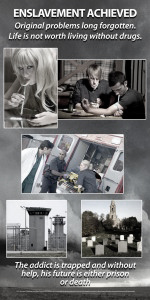 The enslaving power of drugs is a topic under some debate, and there are those who argue that addiction is simply a choice that the individual can unmake any time he wants. It is true that some individuals have been successful in ending their drug use simply by making the choice to do so. It is also a fact is that even after constant drug use has caused an individual to lose his job, his family, his home and his health, he is often still driven to continue taking drugs. In fact, it is not unusual for an addict to reduce himself to theft, dishonesty or prostitution in order to further his drug habit. This is alarming, and more than a little confusing, when one considers that stopping drug use would stop or reverse many of these problems, but many drug addicts can’t – or won’t – stop using drugs. This demands that one reconsider the enslaving power of drugs.
The enslaving power of drugs is a topic under some debate, and there are those who argue that addiction is simply a choice that the individual can unmake any time he wants. It is true that some individuals have been successful in ending their drug use simply by making the choice to do so. It is also a fact is that even after constant drug use has caused an individual to lose his job, his family, his home and his health, he is often still driven to continue taking drugs. In fact, it is not unusual for an addict to reduce himself to theft, dishonesty or prostitution in order to further his drug habit. This is alarming, and more than a little confusing, when one considers that stopping drug use would stop or reverse many of these problems, but many drug addicts can’t – or won’t – stop using drugs. This demands that one reconsider the enslaving power of drugs.
Narconon discusses the enslaving power of drugs in the new booklet “The Truth About Becoming Addicted”. The booklet intends to help educate individuals in the exact cause of initial drug use, the many phases of addiction, and what must occur for an individual to successfully resolve their problems with addiction.
As detailed in the book, drugs work in the brain and nervous system to block and suppress unwanted emotions and sensations. Initially these chemicals are foreign to the body but over time the body can come to depend on the drugs and create physical and mental cravings that are difficult or impossible for the individual to fight. After awhile the individual may completely forget that they originally took a drug to fit in, block pain or suppress anxiety. They have become a slave to the demands of the body, requiring more drugs more often, and they are usually entirely convinced beyond any doubt that they cannot stop.
The Progression of Addiction
Like a cancer, addiction has a slow or fast progression in the user. This progression is as follows:
- An individual encounters a problem and sees what drugs or alcohol use could be the solution to that.
- Environmental factors support this use. Friends or family may be “pro-drug.” The individual may see drug or alcohol use glamorized amongst his or her peers or through the media outlets such as television, or social media.
- He or she uses drugs or alcohol and feels that it temporarily resolves some type of problem.
- Because drugs numb sensations and cause the user to feel “bad” when they stop taking them the drugs or alcohol is used more and more.
- The individual begins to commit transgressions against his own code of moral conduct. He or she does things to hurt others, lies or steals to forward the addiction.
- Unable to quit because of physical withdrawal, the drug user is now enslaved.
- At this point a few things can happen. The addiction can continue to get worse causing the individual to have severe legal, financial, and health problems or they can get help.
One solution to handle this problem is entering treatment through Narconon Arrowhead. Narconon Arrowhead works hard to restore individuals to the position of being in control over their own life and relationships. A program graduate and former addict who has been released from the enslavement of drugs is free to has a very healthy, hopeful outlook on their life, as well they should.
For information about addiction and of the phases of this problem see our latest press release about our Truth About Becoming Addicted book as well as the accompanying graphic: http://www.newsday.com/business/press-releases/narconon-arrowhead-releases-illustrated-series-on-addiction-booklet-1.6525382.